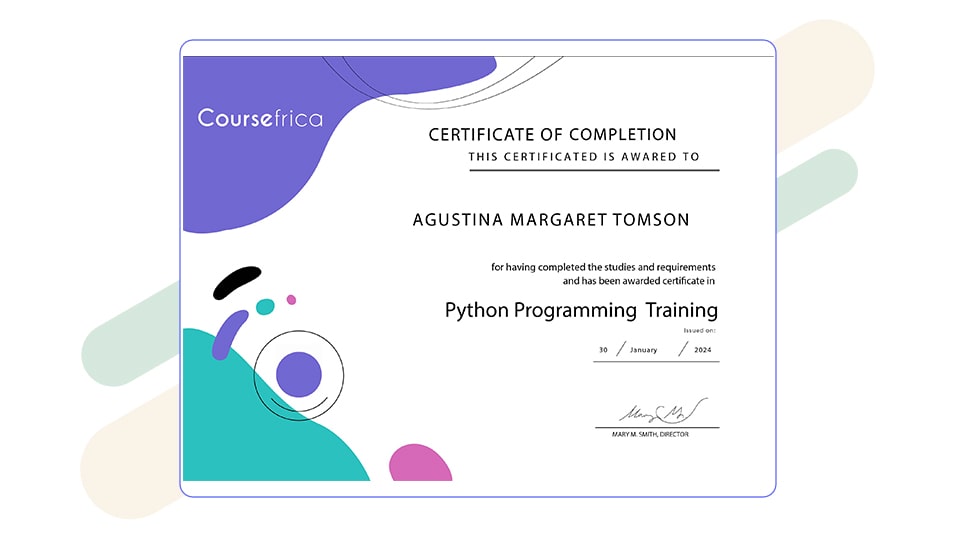Python Programming
Python Programming Course in India
Are you seeking to enhance your level of programming knowledge to allow you to design, write, debug, and run programs encoded in the python language and to understand the basic concepts of software development technology? Keep your interests no longer at bay! Acquire StudySail’s certification in Python programming in India. Explore how to:
- Develop 2D games and simulations
- Automate repetitive tasks in your daily life
- Exploring the programming world for a possible career shift
- Communicate effectively with other developers
- Expand your problems solving skills
- Analyzing and visualizing data

UPCOMING CLASSES
SELECT AN UPCOMING CLASS
PYTHON PROGRAMMING TRAINING HIGHLIGHTS
The Most Effective Python Programming Course in India
High class engagement during offline and live instruction
Practical statistical software experience tackling real-life data challenges
Q&A webinars with experts to give and receive feedback
Group problem solving simulating project work experience
Explore the recent trends in the evolving world of big data, AI, machine learning
Evaluate privacy and ethical considerations for personal and organizational security
UPCOMING CLASSES
SELECT AN UPCOMING CLASS
Python Programming Curriculum
WHAT WILL I LEARN?
Module Info and Overview
Whether you are looking to build websites, automate tasks, or analyze data, Python is a powerful programming language designed for anyone who wants to gain the skills to unlock the world of coding. This in-depth course will take you through an exciting journey of Python programming where you will get into mastering core concepts such as data types, and functions and learn how to write efficient code, debug, troubleshoot errors, and implement coding practices. You will also gain hands-on experience in applying different Python concepts in real-world scenarios. We will explore:
- Core Python fundamentals
- Data types and control flows
- Functions and modules
- Object oriented programming
- Web development with Python
- Data analysis and Automation with Python
- Working on real world projects and project showcase
Module Info and Overview
In this introductory module, we will embark on an exciting journey into the world of Python programming. You will be equipped with skills to lay the foundation for your coding journey. You will explore the core concepts and syntax of python such as understanding what Python is, installing Python on different platforms and python environments that will enable you to write efficient and powerful codes. By the end of this topic, you will have a solid understanding of Python fundamentals and be ready to tackle more advanced topics with confidence. Here we will delve into:
- What is Python in detail
- How to install Python on different platforms and devices
- Exploring Python interactive shell and learn how to execute Python code interactively
- Understanding the basics of writing Python scripts
- Introduction to syntax and data types as a foundation of the language
- Learn different Integrated Development Environments (IDEs) and run simple programs
- Master operators that manipulate data and make programs user-friendly
Module Info and Overview
This topic is the building block of any Python program because it allows you to understand how to manipulate different types of data. This topic will majorly focus on giving you a comprehensive understanding of variables and data types in Python. You will also learn different tools used to organize and manipulate information within your code to help you create effective and functional codes. We will focus on:
- Understanding different data types
- Declaring and assigning variables and assigning values to them
- Converting data from one type to another to ensure the correct format for operations
- Exploring different numeric data types and dictionaries
- Learning about lists to store multiple values in single variables
- Mastering techniques for string manipulation
- Boolean expressions and conditional statements
Module Info and Overview
Now that you have an understanding of the Python enviroment and its basic building blocks, it’s time to delve deeper into the heart of Python programming. This topic will equip you with the tools to perform operations on data and efficiently organize and manipulate it. You will end up with a deep understanding of basic operators and data structures in Python after a thorough delve into:
- Arithmetic operators and how to perform basic mathematical operations in Python
- Assignment operators and how to use short-hand notation
- Comparing values and evaluating conditions in Python
- Logical operators and how to make logical decisions in programs
- Fundamental data structures in Python and their properties
- Dictionary operations such as adding key values and accessing values by keys
Module Info and Overview
By the end of this module, you will be able to structure code into objects that have properties and behaviors. This topic will dive into the powerful paradigm of OOP in Python to enable you to build complex applications in Python. It will also equip you with the skills to create reusable and maintainable programs by mimicking real-world projects. Get ready to:
- Learn the concept of classes and blueprints as blueprints for creating objects
- Explore different attributes and methods to hold data and perform actions
- Understand polymorphism and how to use overriding and overloading methods
- Learn the concept of inheritance to create new classes
- Understand the difference between class and instance variables
- Explore abstraction and encapsulation
- Understand object-oriented design principles like SOLID
Module Info and Overview
In this topic, we will dive deep into the world of modular programming in Python where you will learn how to organize code into reusable units, making programs more maintainable and scalable, and leverage pre-written functionality. You will hone your skills in building more effective applications and collaborating with other developers. You will learn how to:
- Unveil the concept of modules and how to import modules
- Create your modules, define functions, and import them into Python scripts
- Understand Python module search paths for effective coding
- Use the standard library with ease and expertise
- Create and distribute packages using tools like PyPI
- Learn how to create and structure packages for code organization
- Create isolated Python environments for different projects
Module Info and Overview
As a progressing Python programmer, you must interact with data outside your program’s memory. Therefore, in this topic get ready to learn different tools used to read and write data to various file formats along with key techniques for handling errors that might arise during your journey in coding which can be frustrating aspect. To make your coding journey even more exiting, this topic will empower you to:
- Understand how to read, write, and close files in Python
- Know how to file objects and the various methods for reading and writing data files
- Navigate through files using methods like seek and tell
- The concept of exceptions and how to handle common exceptions
- Use different exception-handling strategies
- Discover how to define and raise custom exceptions and handle error conditions
- Solidify your understanding of file handling in real-world applications
Module Info and Overview
Get ready to explore the powerful libraries available in Python for data analysis and manipulation. You’ll learn the wide range of tools and functions of these libraries in handling and analyzing data efficiently. To unlock your potential as a data analyst using Python or a pro in Python programming, you will :
- Learn the introduction to Data Analysis libraries to understand popular libraries such as Numpy and Pandas
- Explore the NumPy library and the powerful tools for working with multi-dimensional arrays
- Dive into a full understanding of the Pand library
- Learn how to use the Matplotlib library to create visualizations such as bar charts and line plots
- Understand advanced data manipulation techniques such as grouping,, filtering, and merging
- Learn data cleaning and preprocessing techniques
- Master how to perform statistical analysis on data using libraries like SciPy
- Discover how to use data analysis libraries in practical scenarios in different fields
Module Info and Overview
In this topic, we will dive into the essential techniques and strategies for ensuring the reliability and correctness of our code in Python. As a crucial step in the development process, you gain the knowledge and skills to identify, isolate, and fix errors and errors in your codes. You will learn about:
- The importance of testing in the development process and preventing them early
- The different testing strategies commonly used in Python
- Frameworks testing and how to write, run, and interpret results of test cases
- Discovering the concept of assertions and the different types of assertions
- Debugging techniques like print statements using a debugger and code inspection
- Frequently encountered Python errors such as Syntax Errors, Type Errors, etc
- Test-driven development (TDD) concepts for well-structured code from the beginning
Module Info and Overview
You are only one step away from becoming a pro in Python programming and this is an essential topic in helping you become that. Python programs are well-structured and easy to understand. Following best practices and coding standards is crucial for producing high-quality code that is readable, reusable, and easy to maintain. Here, you will learn the essential guidelines needed to enhance your coding style and promote collaboration such as:
- Understanding readability and the importance of writing code that is easy to understand
- Learning how to structure your code to improve organization
- Exploring techniques for writing efficient code to avoid unnecessary computations
- Techniques for proper error handling and providing meaningful messages
- Learn about the benefits of using version control systems
- Understand the importance of documenting your code
- Learn how to collaborate with other developers and work within a team
WHY STUDYSAIL
The StudySail Advantage
Up-to-Date Curriculum
Learn recent trends in the industry such as the integration of AI as a tool
Real-Life Experiences and Projects
Gain practical skills through solving real problems with great confidence
Both Live and Recorded Training
Great learning journey through dynamic interactive class discussions
Unlimited Access to Curriculum Content
Learn at your own pace and gain a comprehensive understanding of Python programming
Access to Python programming Peers and Professionals
Network, share, and connect with a worldwide community of project managers
Career Guidance by Industry Leaders
Be empowered through feedback and key career-related insights
WHAT YOU’LL LEARN IN THIS PYTHON PROGRAMMING TRAINING
Learning Objectives
Grasping the fundamentals
Understand core programming concepts like data types, variables, control flow, and functions to build a good foundation for Python programs.
Gain hands-on Experience with Python Code
Learn how to write clear, concise, and well-structured code.
Problem Solving with Python
Develop the ability to approach problems algorithmically and translate them into Python codes.
Master Data Analysis Skills
Understand the fundamental data analysis methods using Python libraries like NumPy for numerical data manipulation and computing
Understand Errors and Debugging
Learn how to identify and fix errors in your code using different debugging techniques like debuggers and code inspection
Master Python Libraries and Modules
Understand the various prewritten Python libraries, how to install and use these libraries
PREREQUISITES FOR PYTHON PROGRAMMING COURSE
Prerequisites and Eligibility
- For this course, you do not need any prior certificate in India. Do you love analyzing data, conducting complex statistical calculations and creating data visualizations and building machine learning algorithms; then this is for you. So basically nothing is hindering you from learning.
- To get more information, please view the FAQs.

WHO SHOULD ATTEND THE PYTHON PROGRAMMING COURSE ONLINE
Who This Course Is For
- Data scientists
- Web developers
- System automation and Administration
- Basic game developers
- Those in Finance and trading
- Security and penetration setters
- General and Application scripters
- Software engineers
- Machine learning engineers
- Those involved in computer graphics
- Analysts

GET THE PYTHON PROGRAMMING CERTIFICATION
Earn the Coveted Python Programming Certification
Once you complete the Python programming course, you will obtain StudySail’s Python programming certification. You will be able to showcase your practical data hacks, providing data driven solutions to a wide array of clients across various both public and private sectors. This certification will cause you to stand out in this current digital data revolution in India and beyond. Furthermore, you will have an opportunity to join the growing global community of data.

FREQUENTLY ASKED QUESTIONS
Python Programming Training & Exams
What is Python programming
Python programming is a computer programming language often used to build websites and software, automate tasks and analyze data. It’s an interpreted, object–oriented, high level programming language with dynamic semantics. Its design philosophy emphasizes code readability with the use of significant indentation. Python supports multiple programming paradigms, including structured (particularly procedural), object – oriented and functional programming.
There are some essential stages of python that every programmer should understand and this include;
- Loops and control flows stage: This includes learning Boolean Operations, Else/If statements, and other different types of loops.
- Exploration of data analysis stage: Here you learn about the building blocks of data analysis/ data science.
- Statistics : In this stage you learn about test data/ segmenting training, working with imbalanced data, framing data science questions, and developing a hypothesis.
Machine learning: This being the last stage you will build creative models with machine learning tools such as scikit-learn
What Are the Benefits of Python Programming Training in India?
Python programming training focuses on equipping you with necessary skills and knowledge to become a qualified software developer, data analyst and data scientist in India. Below are the reasons why Python programming training is important:
- It enhances problem solving skills : Python’s syntax fosters the ability to break down complex problems into manageable tasks and craft efficient solutions.
- Automation of repetitive tasks : Learning Python allows non-programmers to create scripts and programs that automate these tasks, freeing up valuable time for more strategic and creative endeavors .
- Cross functional collaborations: Facilitates smoother communication, leading to innovative solutions that merge technical expertise with domain-specific knowledge.
- Efficiency in data analysis: Mainly to those dealing with large sets of data, enabling them to extract meaningful insights and make data-driven decisions.
- It is applicable in various industries: Its adaptability to different domains makes it a valuable tool for professionals looking to future-proof their skill set
What is the First Thing to Learn in Python programming?
Some foundation elements include understanding the basics concepts of Python such as variables and data types, control flow, functions, file I/O, data structures, modules and packages, libraries and frameworks and error handling and debugging.
What do I need to Know Before Joining Python programming in India?
Python programming is a course that has a challenging learning process but the rewards of the training are massive. It is an important aspect in companies that handle and analyze data and the demand for data analysts is rapidly increasing especially in India where there is an increase in data projects in all sectors.
Can I Be Python programmer certified without a Degree Certification in India?
Yes, you can become certified without a degree certification. A degree may be helpful in getting recruiters’ attention but it is not mandatory. Focus on honing your skills in the path that you have chosen since recruiters prefer dealing with experienced individuals.
Can Python Be Self Taught?
Indeed, you can take the path of learning Python programming on your own if training is not suitable for you. There are a lot of free and paid resources which you can utilize to get started. Ensure that you are consistent with your learning and participate in hackathons and project contributions so as to practically apply theory lessons.
How Do I Prepare for a Python Programming Test?
Know the test format that the test will focus on. Take practice tests, review the official Python programming manual, and participate in study groups or online forums to discuss key concepts and scenarios with other candidates. Additionally, try to identify the specific areas that the test will cover and find some sample questions on the topics.
What is the Toughest Task in a Python programming Project?
Python projects vary hence the toughest task also varies depending on the specific project and your experience level. The common challenges that Python programmers struggle with is python coding, work involved, commitment, concentration and good allocation of time and great understanding.
What is the Hardest Thing in Python programming?
Metaprogramming and the use of metaclasses in python which involves dynamic creation of classes and objects, which can be abstract and hard to understand, involving concepts like class factories and the modification of class behavior at runtime.
What are the Most Popular Python libraries?
Selecting what to read is crucial hence ensure you select a book that deals with the field you are interested in. So one can use NumPy, Pandas, Scikit- learn, Django and Flask.
Can I become a Python programmer in One Year?
Yes, you can become a qualified python programmer in one year or less or even three months but this requires maximum dedication to learning and applying the skills that you have learnt. You need to plan your schedule accordingly and ensure that you are consistent with your learning.
Why is Python used for data science?
Python’s combination of readability, a rich ecosystem of data science libraries, and its versatility, makes it an excellent choice for data science projects. It empowers data scientists to efficiently tackle data – related challenges, conduct complex analyses, and build sophisticated machine learning models.
Where Do I Learn Python programming?
In India, there are various training centers where you can learn python which include online courses, bootcamps and universities. Select which institution is suitable by taking into consideration your availability, learning style, finances, career goals and dedication to the course.
What is the difference Between Python and JavaScript?
Python is used in back-end development , which is part of web development that creates elements that users don’t see, such as the server-side of an application whereas JavaScript can be used to create both front-end and back-end.
What are Some Challenges I Might Face During a Python program?
Understanding object-oriented programming, debugging code, applying knowledge, and recognizing the need to solve problems. However, these challenges can be overcome with targeted learning and practice.

Python Programming Career related FAQs in India
How can I become a Python programmer in India?
Python programming is a suitable path that you can take if you want to explore programming in India. The following are steps that you can follow to become a successful Python programmer:
a) Learn the syntax and coding in Python: Ensure that you learn and understand the basics of Python so as to build a strong foundation in the language. You should also ensure that you master the syntax of the language.
b) Participate in hackathons and build projects: Once you have built your knowledge in Python you can start to participate in hackathons and other competitions to enhance your skills. You can also start to build projects so that you can put the theoretical knowledge you have learnt to practice.
c) Choose a framework that aligns with the field you want to specialize in. Learning a framework makes it easier to develop fully functional projects.
d) Finally, you can create your own portfolio and outline any projects that you have done. You can continuously update it to tailor to the skills that you have gained.
What is the job description of a Python programmer in India?
The job description of a Python programmer in India varies based on the company that you are working for. This position requires you to have a strong understanding of Python syntax, data structures and algorithms and the ability to write clean, reusable and efficient code.
- The following is a list of the responsibilities of a Python programmer in India:
- Developing and implementing Python-based applications.
- Writing and testing code to ensure functionality and efficiency.
- Debugging and troubleshooting applications.
- Collaborating with other developers and stakeholders.
- Staying up-to-date with Python technologies and trends.
- Integrating software components into a fully functional system.
The following are skills and qualifications which various Python programming roles include in their job descriptions:
- Proficiency in Python programming.
- Strong problem-solving and analytical skills.
- Knowledge of software development methodologies (Agile, Scrum).
- Knowledge of database management systems (Mysql, SQL,Oracle).
- Experience with version control systems such as Git.
- Good communication and teamwork skills.
Is Python marketable in India?
Indeed, Python is marketable in India. Python is a versatile and dynamic programming language which makes it suitable for industry users. Python has a large growing community therefore more people are making use of the language. Python can also be used across various industries thus making it a better language than most.
Which soft skills should I possess to get a Python programming job in India?
Most Python programmers in India possess technical skills that are necessary to get a job. However, soft skills can make a difference when applying for a job. The most important soft skills you should have as a Python programmer are problem solving, communication skills, patience, adaptability, time management and teamwork.
What are the salary prospects of a Python programmer in India?
The salary for Python programmers in India varies significantly based on factors such as experience level, company size, industry, location and your skills. If you are a beginner the salary ranges from $300 to $600, $900 to $2000 for mid-level programmers and above $2000 for senior programmers.
What is the role of Python programming in India?
Python is one of the most popular programming languages in India and the world. Additionally, it is a general purpose language which is used in a range of applications such as web development, software development, automation, machine learning and data science.
Who uses Python in India today?
Python is used in various industries in India today ranging from fintech industries to the agricultural sector. Several start-ups and IT companies regularly advertise Python programming job roles which vary based on the field of programming you are interested in.
Which major companies use Python?
Python’s popularity is fueled by its extensive use in tech giants. Google, Facebook and Netflix rely on Python’s versatility for their complex operations thus driving its prominence in the programming world. It also has a large active community which ensures that Python will be around for a long time.
Which skills are required for an entry level Python job in India?
If you are interested in an entry level Python position, you must have basic Python programming knowledge such as the syntax and semantics. You should also be knowledgeable in other technical skills such as database management, version control and data structures and algorithms.
How can I get a Python job in India if I have no experience?
Landing a Python job if you have no experience can be very challenging but it is not impossible. You can do certification courses on sites such as StudySail to prove your proficiency in the language. You can also volunteer or do internships so that you gain some practical experience.
Can I get a job by only learning Python?
Yes, learning Python alone can get you a job in the Indian market. However, it is important that you have other skills as well to complement Python. Do thorough research on the domain that you are interested in then build up skills which are required in that area.
What are the job opportunities that Python programming offers in India?
Python programming offers a wide variety of job opportunities for programmers in India. You can become a software developer who mainly deals with building Python applications. You can also become a data scientist, data analyst, machine learning expert, web developer or a devops engineer for automation and infrastructure management.
How can I get a Python programming internship in India?
Most companies in India advertise for internship positions once they are available. You can look for such positions by conducting an internet search on available opportunities. You can also apply by dropping your papers at the physical location of the company you are interested in.
Is Python programming a high stress job?
Indeed, Python programming is a high stress job for most individuals. The tech industry is rapidly evolving so there are major changes which occur within a short time. Python programmers need to stay updated with these changes while conducting their everyday responsibilities concurrently.
What is the best way to build a Python portfolio?
You can build an appealing portfolio by contributing to open source projects, creating personal projects, participating in coding challenges and showcasing your works on platforms such as Github. Conduct extensive research on better ways to improve your portfolio thus attracting recruiters.
India, a vast and diverse nation with a rich cultural heritage and a rapidly growing economy, places a strong emphasis on education as a pathway to social progress and economic development. The education system reflects this commitment, offering a diverse curriculum that integrates academic excellence with practical skills development and cultural awareness. From primary education to tertiary institutions, India provides diverse educational opportunities for students of all backgrounds. Access to education is a priority, with government initiatives targeting rural communities and marginalized groups. The economy, diverse in sectors such as information technology, manufacturing, and services, offers ample career pathways for graduates. Extracurricular activities, including sports clubs and community service projects, foster leadership and civic engagement among students. International partnerships enrich India's education system, promoting collaboration in research, teacher training, and cultural exchange. Challenges include addressing educational disparities and improving infrastructure to meet the needs of a growing population. Through resilience and collaboration, India is paving the way for a brighter future rooted in education and social cohesion.
We also deliver Python Programming Training across multiple cities in India
Enroll today for
Project Management Course
- Interactive Learning Features
- Expert Instructors
- Community and Networking
- Progress Tracking and Analytics
- Digital and Physical Certificate







